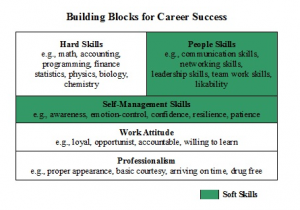by Charles Plant | Mar 14, 2013 | Learning

I thought of using the term Brain Plasticity in the title to this blog but since I didn’t understand the term I figured ‘Use it or Lose it’ would be a better way to go. But then that’s the point isn’t it? If you want to retain something you’ve learned, you have to use it on a regular basis. It’s the way your brain works.
Some 20 years ago, researchers found that with the right stimulus, brain deterioration and ageing was in fact reversible. The brain actually changes as you improve an ability. The local wiring changes how its connected and those changes result in the acquisition of an ability. The brain evolves as you acquire an ability.
It’s the reason that the Seven Times Principle works. So if you want to learn something:
- Write it down
- Repeat it seven times
- Make sure you’re tested on it.
- Use it or lose it.
by Charles Plant | Mar 13, 2013 | Learning
 Did you ever wonder why your teachers told you to study early and often for a test? Well it turns out that there may be something to it. You’re actually better off distributing your practise on anything rather than trying to learn something by cramming.
Did you ever wonder why your teachers told you to study early and often for a test? Well it turns out that there may be something to it. You’re actually better off distributing your practise on anything rather than trying to learn something by cramming.
The problem is that it is easier to teach things in a group and not in a distributed pattern.It’s also more convenient although not better to learn that way. That’s why leadership and other improvement courses are all put in a day or a closely packed series of days, rather than over a longer period.
But studies by such researchers as Ebbinghaus and Dempster have been showing over the last century that distributed practise leads to more durable learning. I guess it comes back to the Seven Times Principle. You need to hear or try something seven times before it sticks.
If you’re trying to train someone on anything it will also work. You’ll have to get them to try it seven times before it will stick.
by Charles Plant | Mar 11, 2013 | Learning
 Do you remember the one person in the class who, when presented with something a little out of the ordinary, would ask the prof: will this be on the test?
Do you remember the one person in the class who, when presented with something a little out of the ordinary, would ask the prof: will this be on the test?
Think now to the answer. If it was not going to be on the test, would you bother learning it or even bother reviewing the material once? I didn’t think so.
Now think about your company’s values. Can you even remember what they are. Heaven knows, some group of executives spent a long time coming up with them. But do they form part of your annual performance appraisal? Are you judged on how well you exhibit those values, how close you are to achieving them?
Chances are you aren’t evaluated on such things as how you exemplify the company’s values and that’s a problem. If it won’t be on the test, you won’t even think twice about it.
If you want someone to learn something and to change their behaviour, they have to think they’ll be evaluated on it or chances are it will go in one ear and out the other.
by Charles Plant | Aug 20, 2012 | Leadership Development, Learning
 Every now and then you meet someone with extraordinary intrapersonal skills but chances are, you may not even know it. That’s because you usually notice it only when someone has poor skills in this area.
Every now and then you meet someone with extraordinary intrapersonal skills but chances are, you may not even know it. That’s because you usually notice it only when someone has poor skills in this area.
Someone without good intrapersonal skills might be timid, take stupid risks or start yelling and screaming at the drop of a hat. You tend to notice these extremes of behaviour but you don’t notice it when someone is balanced and even tempered.
Intrapersonal skills are the foundations of a successful career. This is emotional intelligence, the ability to know, understand and mange your own emotions.
Years ago, I used to look at senior people in companies and wonder how on earth they got to where they are. With time I came to recognize that a lot of their success was predicated on emotional intelligence and have come to recognize that this type of intelligence has two parts, interpersonal skills and interpersonal skills.
I started looking at this list of interpersonal skills and found a whole slew of them that warranted examination. This isn’t an exhaustive list as there are so many skills you could list in this area
The List
Some people are high in some skills and low in others and no two people have the same set of skills in the same degrees. And the mix probably doesn’t correlate with effectiveness.
You just need enough interpersonal skills in enough different areas to be effective in a work situation..
by Charles Plant | May 24, 2012 | Innovation, Learning
 Creative people don’t retire. They just keep on creating.
Creative people don’t retire. They just keep on creating.
It’s probably because we love our work that we never want to stop. The question is: Do you love what you do enough to say the same thing? Do you love your work enough to never want to retire? And if you don’t then why not?
Why would you stay doing something that you didn’t absolutely love?
by Charles Plant | May 9, 2012 | Learning
We all talk about Soft Skills and perhaps many of you are like me, you have trouble identifying what Soft Skills actually are. I found a good post the other day that laid it out. You can see the post here. Even better than the post was the accompanying chart. What I noticed right away is that as managers, we tend to hire for the Hard Skills and run into performance problems with the Soft Skills.







